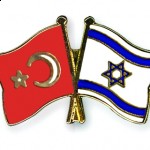Sunday
Jan312010
Turkey: Foreign Minister Davutoglu on Afghanistan and Ankara's Foreign Policy
 Sunday, January 31, 2010 at 7:17
Sunday, January 31, 2010 at 7:17  EA correspondent Fulya Inci writes:
EA correspondent Fulya Inci writes:As the London Conference convened on Pakistan and Afghanistan on Thursday, Turkish officials Pakiistani and Afghan counterparts. That was the fourth tripartite meeting for a regional initiative for Afghanistan since Turkish Foreign Minister Ahmet Davutoglu took office.
In an interview with the Turkish channel NTV, Davutoglu set out Turkey’s approach toward Afghanistan’s future. He defined explained Afghanistan’s importance for Turkey: stability and political balance in Asia, Turkey’s mission in the country as part of a NATO force, and the historical friendship between Ankara and Kabul. Turkey has pursued a "safety zone" in Afghanistan, providing $200 million in economic aid.
Turkey: “Ankara Ready to Mediate between Syria and Israel”
Asked about an opportunity to the Taliban to play a role in Afghanistan’s future, Davutoglu supported a political arrangement that covers all groups and minorities, even if they are armed militants. He asserteded that such a strategy will engage the Afghan people, who have a say in the defence, stability, and security of their country.
Beyond Afghanistan, Davutoglu offered a series of statements on Turkey's current foreign policy. He criticized the recent intervention of the Armenian Constitutional Court in the October 2009 protocol which sought to normalize the relationship between Armenia and Turkey. He referred to the issue of the status of Nagorno-Karabakh, disputed between Armenia and Azerbaijan, saying that Turkey is still hopeful for the process of resolution.
Davutoglu rejected the idea that there has been a "shift in the axis" of Turkish foreign policy, claiming that Ankara's main principle was “being constructive in all peaceful efforts, irrespective of whether they are in the West or East”.
tagged  Ahmet Davutoglu,
Ahmet Davutoglu,  Armenia,
Armenia,  Azerbaijan,
Azerbaijan,  NATO,
NATO,  Nagorno-Karabakh,
Nagorno-Karabakh,  Turkey in
Turkey in  Afghanistan,
Afghanistan,  Europe & Russia
Europe & Russia
 Ahmet Davutoglu,
Ahmet Davutoglu,  Armenia,
Armenia,  Azerbaijan,
Azerbaijan,  NATO,
NATO,  Nagorno-Karabakh,
Nagorno-Karabakh,  Turkey in
Turkey in  Afghanistan,
Afghanistan,  Europe & Russia
Europe & Russia 



